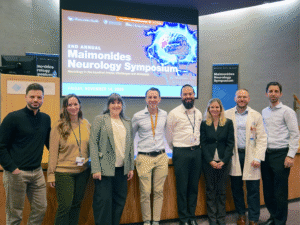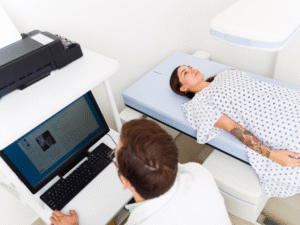Dr. Murray Choueka, Director of Headache Medicine, discusses how to distinguish between types of headaches, like migraines and tension-type headaches, and how to know when they could be an indicator of something more serious and necessitate a trip to the doctor. Most importantly, headaches sufferers should know they don’t just have to live with the pain – effective treatments and preventative measures exist.
Listen on Spotify, Apple Podcasts, or iHeartRadio.
Maggie McKay (Host): When a debilitating headache comes on, how do you know if it’s serious enough to see a doctor or just take care of it with a solution at home or wherever you may be? Today, we’ll find out with Dr. Murray Choueka, Director of Headache Medicine.
Welcome to Maimo MedTalk. I’m your host, Maggie McKay. Thanks for joining us today, Dr. Choueka.
Murray Choueka, MD: Thank you, Maggie. It’s nice to be here.
Host: As Director of Headache Medicine, what does your position entail?
Murray Choueka, MD: So as the Director of Headache Medicine at Maimonides, I’m in charge of all headache care here. I mainly see patients with migraine and other headache disorders in our outpatient center. Occasionally, I’ll also see patients in the hospital as well with headache disorders.
Host: So, let’s say you wake up with a bad headache, serious enough to keep you in bed, and it doesn’t let up, even though you rested and took extra strength pain relief. What then?
Murray Choueka, MD: Right. So, that’s a very common question and a lot of people with migraine have this problem where they just can’t get out of bed and it’s really debilitating. There are a lot of things that you can do at home for a migraine. So, the first thing that I always recommend is addressing any provoking factors that may be present for that headache. So if you’re really dehydrated, it may be a good idea to go grab a glass of water. If you haven’t eaten breakfast that day, maybe go grab a bite to eat. After that, you really want to consider a medication if you have a headache that won’t go away. Some of the best home medications that you can take are ibuprofen or Tylenol. Ibuprofen tends to work better for migraines, so I usually recommend that one. Very commonly though, patients will only take 200 milligrams, which is like one pill of ibuprofen. But really, you need to take about three pills. That’s actually the correct dose for migraine. Tylenol may work, and for some people, it doesn’t work.
Host: So, Tylenol, two and ibuprofen, three?
Murray Choueka, MD: Right. Tylenol, two pills of the 500 milligrams would be the right dose. And for ibuprofen or Motrin or Advil, whichever brand you have at home, three pills of the 200 milligrams would be the right dose.
Host: Okay. So, how do you know the difference between a migraine and just a really bad headache?
Murray Choueka, MD: A lot of my patients, they come in and they tell me they get all these regular headaches, and then they also get migraines on top of that. So, let’s talk about what the difference is. So, the regular headache that most people are referring to is called a tension-type headache. These types of headaches, they feel like a band around the head. Typically, they’re not going to become nauseous or sensitive to light or sound. Over-the-counter medications like Tylenol or ibuprofen tend to work really, really well. For these headaches, very few people actually go see a doctor because they respond well to treatment. Most patients will treat it by themselves, never tell their doctor about it, unless it becomes really frequent, or if the headaches change in some way and they get concerned about it.
A migraine is the complete opposite of all those things. Migraine is the complete opposite of tension-type headache. You may have it only on one side of the head, rather than on both sides of the head. Instead of a band like or tension-type feeling, it’s going to feel like throbbing or stabbing. They’re typically more debilitating, and you will have to stop what you’re doing. You may get nauseous, you might vomit from it and, very commonly, you’re sensitive to light or sound. So typically, you may have to go to your bed, turn off the lights, get rid of whatever noise is around you. Tylenol typically does not work, unless it’s a mild migraine. For more severe migraines, at-home medications, ibuprofen 600 milligrams, like we discussed before, would be appropriate.
Now, the difference between tension headache and migraine, can be a little bit difficult to discern. For migraine, you don’t have to have all those features we talked about. Even one or two of them suggest that you probably have migraine and not tension-type headache. And this is where a lot of people are underdiagnosed or misdiagnosed as tension-type headache, and really they have migraine, which has a whole other range of treatments available.
Host: All right. Don’t laugh, Dr. Choueka. But I read that if you blow dry the back of your neck and shoulders during a bad headache, it reduces the swelling and helps. Is that accurate?
Murray Choueka, MD: Unfortunately, that is not accurate. Any intervention that you perform for a headache has a chance of having a placebo effect. So even things that have been proven not to work, in research studies may actually help your headache. And we see that routinely in clinical trials where the groups that get a placebo, a water pill, a portion of them do get better.
Host: Ice or heat or neither?
Murray Choueka, MD: Most of my patients find that ice works better than heat. Ice pack to the back of the head sometimes works or really wherever the headache is. And it tends to help more for patients who have tenderness on their scalp with the headache.
Host: What about those sinus headaches between your eyes?
Murray Choueka, MD: I see so many patients who are actually referred by ear, nose, and throat doctors. They go to an ENT doctor. And they do an endoscopy, they look at the sinuses, or they get a CAT scan or MRI, and the sinuses are completely clear. But they keep getting these headaches, where they just feel congested, and their eyes might run, or their eyes might get red, and the headaches are right in the front of the head and the upper part of the face. That’s a very common migraine actually. Migraine can cause sinus congestion as well.
Host: So, how do we know when to call the doctor? When you’ve had it more than a day or…?
Murray Choueka, MD: Right. So really, if there’s any neurologic symptom that you’re concerned about, like changes in your vision with these headaches, numbness, weakness, or if you have like a really very sudden onset headache, and that’s very severe and worse than anything you’ve had before, those are actually medical emergencies, and you should go to the emergency room.
But if you’re just having headaches and you’re just not sure, is this something I should bring up with the doctor, here are some things that you may want to consider. If your headaches are getting more frequent, if they’re worsening in severity, or they’re changing in how they feel, then it might be a good idea to have a conversation with your doctor to make sure nothing dangerous is going on, and also to treat it. There are a lot of good preventive treatments, a lot of good treatments you could take as needed for headache, so it’s really a good idea to have a conversation with your doctor.
Another common reason why you may want to see a doctor is if, let’s say, the frequency, severity of headaches is the same, but they’re just not responding to Tylenol or ibuprofen, even when you take the right dose, that’s a good time to go see either your primary care doctor or a neurologist.
Host: What about prevention? Anything we should know about trying not to get headaches to begin with?
Murray Choueka, MD: Prevention is the best treatment actually, because it’s better not to get a headache than to treat a headache when you have one. There are a lot of things you can actually do at home to prevent headache. And for some people, these measures will have a big effect, and for others, they won’t have much of an effect. It really varies by person.
So, the first one, and most important one, is drinking lots of water, or other beverages, as long as they’re not caffeinated and filled with sugar, like a soda. Your brain doesn’t like being dehydrated. The saying, “Eight glasses of water,” really does hold true for migraine patients.
On that note, reducing caffeine intake. It’s okay to have a cup of coffee every day. But if you have three extra large Starbucks iced coffees, that’s not going to be good. It’s not the same as getting water, and excessive caffeine causes dependence, tolerance, and can actually worsen your headaches in the long run.
Host: What about sleep?
Murray Choueka, MD: Sleep, great question. Getting eight hours of sleep is really, really good, and also keeping a consistent schedule. That means not changing it on the weekends and sleeping 12 hours instead of eight. The amount of sleep that each person needs varies from person to person. For some people, it’s six and a half hours. For some people, it’s nine hours. But keeping a routine, getting good sleep is very important for your headaches. And if you sleep well, you’ll likely get less headaches.
Host: If we do have to go to the doctor, what can we expect? Will they do a CAT scan, an ultrasound? How does that work?
Murray Choueka, MD: Yeah. So if you have a story that’s very typical for migraine or tension-type headache, and it hasn’t been dramatically changing recently, typically, we don’t do any imaging, we don’t do a CAT scan, and we don’t do an MRI. Migraine and tension headache are not caused by things like brain tumors generally.
And there are features that we can see when we talk to you and when we examine you that may suggest that that is a concern. So in those cases, we’ll get imaging. So I think it’s really a conversation to have with the doctor about whether imaging is appropriate for you. But in general, I really like to avoid imaging and finding things that have nothing to do with your headaches.
Host: Are there any certain foods to avoid that bring on headaches? I mean, you mentioned caffeine. What about foods?
Murray Choueka, MD: Yes. So, there are some foods that in some people can trigger a headache, but it varies from person to person. Some common ones that I hear from patients are chocolate, specific types of alcohol, MSG, but it really varies. There’s no one specific food that has been proven to trigger migraine in most patients.
So, what I tell people is look for things that trigger a headache for you. And if you find that a specific food or a specific drink triggers it for you, then avoid that food. But on the topic of food, eat three meals a day. It’s important that your body doesn’t go many hours without food. Very commonly, patients will skip breakfast. And their headaches commonly start in the middle of the day. And the reason for that might be that they went 15 hours without food, if you think about how much time there is between dinner the night before and lunch on the next day.
Host: What about people who are fasting? If they drink enough water, is that okay?
Murray Choueka, MD: Yeah. So, fasting is a common question that we get. There are different types of fasts, very often for religious reasons, sometimes for health reasons. Fasting in general is not great for your headaches. Your body doesn’t like to be without sugar. If you do have to fast for a religious reason or for any other reason and drinking water is okay, I always recommend drinking as much water as possible. But you still will be at higher risk for getting a headache during the fast.
Host: Dr. Choueka, is there any research being done to help those with chronic migraines? I have a friend who has tried everything through the years and nothing has worked. So, any hopeful research in the future?
Murray Choueka, MD: Yes. There are always new things being researched in migraine. Even for patients that have tried everything, there’s always more to try. There are always new things coming out. And even when people tell me they’ve tried everything, I usually look and they find that there are a bunch of medications that they haven’t tried that may be helpful.
So, don’t lose hope. There are always more things to try. If you’ve tried everything, this is a good time to go see a headache specialist and see if there’s anything more to try. Some common new medications that we’re looking at are medications that target CGRP, which is an inflammatory molecule that’s involved in migraine. A lot of the new medications are really geared towards this, and we’re finding a lot of success with these medications.
Host: Well, that’s very encouraging. Is there anything else you’d like to add?
Murray Choueka, MD: Yes. On the topic of prevention, there are a couple more things that we should actually talk about. And these are non-medication options. Exercise has been shown to reduce the frequency of headache. And this is something that most people actually don’t do. But exercising routinely, that means cardiac exercise, getting your heart rate up, doing that even two times a week can reduce the amount of headaches you have.
Another thing that can help, reducing stress, easier said than done, but it’s a very common trigger, it’s probably the most common trigger for a headache that patients tell me about. If you feel that you’re anxious or you’re depressed, that may be something to bring up with your primary care doctor, as that can worsen headaches. And treating anxiety and depression can actually help with your headaches.
I very often also get asked about vitamins and supplements. So, there are a whole range of vitamins and supplements that they say on the bottle, this will help with your headaches, or it may help with your headaches, or you may see commercials for something or an advertisement online. There are a few that have been shown to potentially help with headaches. And the ones that I do recommend are magnesium, riboflavin, or vitamin B2, and feverfew. So, those are just a few common ones that may help with your migraine. There are a few others. But I think if people want to try vitamins, those are the ones that I tend to start with, and they’re relatively safe. So, those are good to try taking.
Host: Well, thank you so much for being here. This has been so educational and useful and hopeful too.
Murray Choueka, MD: Yes, Maggie, thank you for having me.
Host: Again, that’s Dr. Murray Choueka. Call 718-283-7470 to make an appointment. That’s 718-283-7470 to make an appointment. For general information, visit maimo.org, M-A-I-M-O.
If you found this Maimo MedTalk podcast helpful, please share it on your social media channels. To listen to additional episodes of Maimo MedTalk, please visit maimo.org. I’m Maggie McKay. Thank you for listening. This is Maimo MedTalk, a podcast from Maimonides Health.







